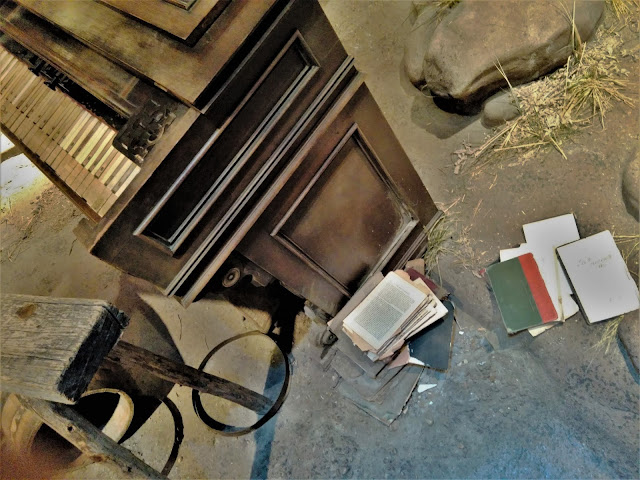Be careful you do not start
with any unnecessary baggage.
The road at present is strewed with nearly everything
from a steam kettle to a child's cradle.
So wrote George Keller in 1851 in a guidebook for travelers on the Oregon Trail. It's difficult to imagine what things must have looked like, and yet it's understandable that travelers would have to dump things--treasures, heirlooms, precious bulky items--hither and yon along the trail, things like this spinning wheel, on display in a museum at Chimney Rock.
At an odd little museum that stretches over I-80 at North Platte, NE, the display just below features a piano and books abandoned along the trail. Some remembrances claim so many books left behind created a free-loan library. Pick one up, take it with for a couple days, read it, then drop it off somewhere else farther west. Books and pianos and spinning wheels turned the trail--sometimes four or five miles wide--into a national flea market full of abandoned treasures.
A letter Narcissa Whitman wrote to a friend tells the story fetchingly. She sweetly apologizes to a trunk that, achingly, had to be left behind. (Keep Kleenex handy.)
Dear Harriet, the little trunk you gave me has come with me so far, and now I must leave it here alone. Poor little trunk, I am sorry to leave thee; thou must abide here alone, and no more by thy presence remind me of my dear Harriet. Twenty miles below the falls on Snake river this shall be thy place of rest. Farewell, little trunk, I thank thee for thy faithful services, and that I have been cheered by thy presence so long.
The passage doesn't require a picture. That little trunk makes a sad appearance in the imagination without your or my having the slightest idea what it looked like. But, broken-hearted, she can't not blame someone or something for what she must abandon. She points her loving husband's way. "Husband," she calls him.
Thus we scatter as we go along. The hills are so steep and rocky that husband thought it best to lighten the wagon as much as possible and take nothing but the wheels, leaving the box with my trunk. I regret leaving anything that came from home, especially that trunk, but it is best.
What became especially difficult was having to lug every last item by hand and arm and back and hook and crook over water and through impassable creek beds.
It would have been better for me not to have attempted to bring any baggage whatever, only what was necessary to use on the way. It costs so much labor, besides the expense of animals. If I were to make the journey again I would make quite different preparations. To pack and unpack so many times, and cross so many streams where the packs frequently get wet, requires no small amount of labor, besides the injury of the articles. Our books, what few we have, have been wet several times. In going from Elmira to Williamsport this trunk fell into the creek and wet all my books, and Richard's, too, several times. The sleigh box came off and all of us came near a wetting likewise. The custom of the country is to possess nothing, and then you will lose nothing while traveling. Farewell for the present.
And thus, that little trunk full of all those memories is (sniff, sniff) left behind.
Woe and woe and woe.
___________________________
P.S. The next day's journal entry begins this way:
"Dear Harriet, Mr. McKay has asked the privilege of taking the little trunk along, so that my soliloquy about it last night was for naught."
Lost, but not abandoned.
Relax.


No comments:
Post a Comment